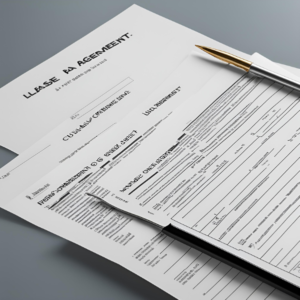Customizing Lease Agreement Templates for Commercial Use
 Navigating the world of commercial leases can be complex. This guide provides a step-by-step guide to customizing lease agreement templates for your specific commercial needs.
Navigating the world of commercial leases can be complex. This guide provides a step-by-step guide to customizing lease agreement templates for your specific commercial needs.
Commercial leases are more intricate than their residential counterparts, requiring careful customization to reflect the unique needs of both landlords and tenants.
This guide will walk you through the process of customizing a template to ensure your commercial lease agreement is comprehensive and legally sound.
Understanding the Basics: Key Elements of a Commercial Lease
Before diving into customization, let’s outline the essential elements typically found in a commercial lease:
-
Parties Involved: Clearly identify the landlord and tenant, including legal names and business structures.
-
Premises: Describe the specific property being leased, including address, square footage, and any designated areas.
-
Lease Term: Define the duration of the lease, including start and end dates, and any renewal options.
-
Rent and Payment Terms: Specify the monthly rent amount, payment due dates, and acceptable payment methods.
-
Use of Premises: Clearly define the permitted use of the property, including any restrictions or limitations.
-
Maintenance and Repairs: Outline responsibilities for maintenance, repairs, and who is responsible for specific repairs.
-
Insurance Requirements: Specify insurance requirements for both landlord and tenant, including liability and property damage coverage.
-
Termination Clause: Detail the conditions under which the lease can be terminated, including breach of contract or non-payment.
Customizing Your Template: Key Considerations
1. Define the Scope of Use:
Clearly define the permitted use of the property. Be specific about the type of business allowed, any restrictions on operating hours or activities.
2. Tailor Rent and Payment Terms:
Customize the rent amount, payment schedule, and any escalation clauses for rent increases.
3. Address Specific Needs:
Include clauses addressing unique requirements, such as build-out allowances, tenant improvements, or specific industry regulations.
4. Consider Legal Counsel:
Consult with a real estate attorney to ensure your customized lease complies with local laws and protects your interests.
5. Review and Revise:
Carefully review the customized agreement, ensuring clarity and accuracy.
Sample Clause: Use of Premises
Here’s an example of a clause addressing the use of premises:
Use of Premises:
The Premises shall be used solely for the operation of a [Specify Type of Business] business. Tenant shall not use the Premises for any other purpose without the prior written consent of Landlord.
FAQs About Customizing Commercial Lease Agreements
1. Can I add clauses not included in the template?
Yes, you can add clauses specific to your needs, but ensure they comply with local laws.
2. What if I need to make changes after signing the lease?
Amendments to the lease require written agreement from both parties.
3. Can I negotiate the terms of a commercial lease?
Yes, most terms are negotiable, including rent, lease duration, and responsibilities.
4. What happens if a tenant violates the lease agreement?
Landlords have legal recourse, including eviction or pursuing legal action.
5. What are common legal issues in commercial leases?
Common issues include rent disputes, maintenance responsibilities, and lease termination.
6. Can I use a residential lease template for commercial use?
No, commercial leases are significantly different from residential leases.
7. What are the benefits of having a lawyer review the lease agreement?
A lawyer can ensure the agreement protects your interests and complies with local laws.
8. What are some common clauses specific to commercial leases?
Common clauses include rent escalation clauses, tenant improvement allowances, and subleasing provisions.
9. Where can I find reputable sources for commercial lease templates?
Consult with a lawyer or use reputable online resources like Nolo or Rocket Lawyer.
10. What are the consequences of not customizing a lease agreement?
Failing to customize a lease can lead to disputes and legal issues.
Disclaimer: This information is for educational purposes only and should not be considered legal advice. Consult with a qualified legal professional for personalized guidance.